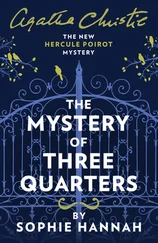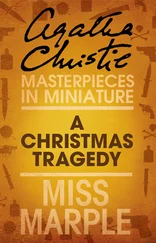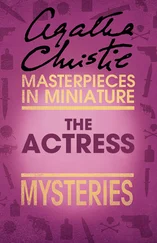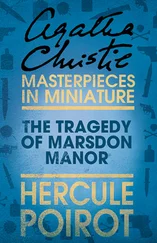Agatha Christie - Three Act Tragedy
Здесь есть возможность читать онлайн «Agatha Christie - Three Act Tragedy» весь текст электронной книги совершенно бесплатно (целиком полную версию без сокращений). В некоторых случаях можно слушать аудио, скачать через торрент в формате fb2 и присутствует краткое содержание. Жанр: Классический детектив, на английском языке. Описание произведения, (предисловие) а так же отзывы посетителей доступны на портале библиотеки ЛибКат.
- Название:Three Act Tragedy
- Автор:
- Жанр:
- Год:неизвестен
- ISBN:нет данных
- Рейтинг книги:4.5 / 5. Голосов: 2
-
Избранное:Добавить в избранное
- Отзывы:
-
Ваша оценка:
- 100
- 1
- 2
- 3
- 4
- 5
Three Act Tragedy: краткое содержание, описание и аннотация
Предлагаем к чтению аннотацию, описание, краткое содержание или предисловие (зависит от того, что написал сам автор книги «Three Act Tragedy»). Если вы не нашли необходимую информацию о книге — напишите в комментариях, мы постараемся отыскать её.
Three Act Tragedy — читать онлайн бесплатно полную книгу (весь текст) целиком
Ниже представлен текст книги, разбитый по страницам. Система сохранения места последней прочитанной страницы, позволяет с удобством читать онлайн бесплатно книгу «Three Act Tragedy», без необходимости каждый раз заново искать на чём Вы остановились. Поставьте закладку, и сможете в любой момент перейти на страницу, на которой закончили чтение.
Интервал:
Закладка:
“What had happened to your wife? If she were still alive, why did nobody know about her? If you were living apart there was the remedy of divorce. If your wife was a Catholic, or one who disapproved of divorce, she would still be known as living apart from you.
“But there are two tragedies where the law gives no relief. The woman you married might be serving a life sentence in some prison, or she might be confined in a lunatic asylum. In neither case could you obtain a divorce , and if it had happened while you were still a boy nobody might know about it.
“If nobody knew, you might marry Miss Lytton Gore without telling her the truth. But supposing one person knew – a friend who had known you all your life? Sir Bartholomew Strange was an honourable, upright physician. He might pity you deeply, he might sympathise with a liaison or an irregular life, but he would not stand by silent and see you enter into a bigamous marriage with an unsuspecting young girl.
Before you could marry Miss Lytton Gore, Sir Bartholomew Strange must be removed… ”
Sir Charles laughed.
“And dear old Babbington? Did he know all about it, too?”
“I fancied so at first. But I soon found that there was no evidence to support that theory. Besides, my original stumbling block remained. Even if it was you who put the nicotine into the cocktail glass, you could not have ensured its reaching one particular person .
“That was my problem. And suddenly a chance word from Miss Lytton Gore showed me light.”
“The poison was not intended especially for Stephen Babbington. It was intended for any one of those present, with three exceptions. These exceptions were Miss Lytton Gore, to whom you were careful to hand an innocent glass, yourself, and Sir Bartholomew Strange, who, you knew, did not drink cocktails.”
Mr. Satterthwaite cried out:
“But that’s nonsense! What’s the point of it? There isn’t any.”
Poirot turned towards him. Triumph came into his voice.
“Oh, yes, there is. A queer point – a very queer point. The only time I have come across such a motive for murder. The murder of Stephen Babbington was neither more nor less than a dress rehearsal .”
“What?”
“Yes, Sir Charles was an actor. He obeyed his actor’s instinct. He tried out his murder before committing it. No suspicion could possibly attach to him. Not one of those people’s deaths could benefit him in any way, and, moreover, as everyone has found, he could not have been proved to have poisoned any particular person. And, my friends, the dress rehearsal went well. Mr. Babbington dies, and foul play is not even suspected. It is left to Sir Charles to urge that suspicion and he is highly gratified at our refusal to take it seriously. The substitution of the glass, too, that has gone without a hitch. In fact, he can be sure that, when the real performance comes, it will be ‘all right on the night.’
“As you know, events took a slightly different turn. On the second occasion a doctor was present who immediately suspected poison. It was then to Sir Charles’s interests to stress the death of Babbington. Sir Bartholomew’s death must be presumed to be the outcome of the earlier death. Attention must be focused on the motive for Babbington’s murder, not on any motive that might exist for Sir Bartholomew’s removal.
“But there was one thing that Sir Charles failed to realise – the efficient watchfulness of Miss Milray. Miss Milray knew that her employer dabbled in chemical experiments in the tower in the garden. Miss Milray paid bills for rose spraying solution, and realised that quite a lot of it had unaccountably disappeared. When she read that Mr. Babbington had died of nicotine poisoning, her clever brain leaped at once to the conclusion that Sir Charles had extracted the pure alkaloid from the rose solution.
“And Miss Milray did not know what to do, for she had known Mr. Babbington as a little girl, and she was in love, deeply and devotedly as an ugly woman can be, with her fascinating employer.
“In the end she decided to destroy Sir Charles’s apparatus. Sir Charles himself had been so cocksure of his success that he had never thought it necessary. She went down to Cornwall, and I followed.”
Again Sir Charles laughed. More than ever he looked a fine gentleman disgusted by a rat.
“Is some old chemical apparatus all your evidence?” he demanded contemptuously.
“No,” said Poirot. “There is your passport showing the dates when you returned to and left England. And there is the fact that in the Harverton County Asylum there is a woman, Gladys Mary Mugg, the wife of Charles Mugg.”
Egg had so far sat silent – a frozen figure. But now she stirred. A little cry – almost a moan – came from her.
Sir Charles turned superbly.
“Egg, you don’t believe a word of this absurd story, do you?”
He laughed. His hands were outstretched.
Egg came slowly forward as though hypnotised. Her eyes, appealing, tortured, gazed into her lover’s. And then, just before she reached him, she wavered, her glance fell, went this way and that as though seeking for reassurance.
Then with a cry she fell on her knees by Poirot.
“Is this true? Is this true?”
He put both hands on her shoulders, s firm, kindly touch.
“It is true, mademoiselle.”
There was no sound then but Egg’s sobs.
Sir Charles seemed suddenly to have aged. It was an old man’s face, a leering satyr’s face.
“God damn you,” he said.
And never, in all his acting career, had words come with such utter and compelling malignancy.
Then he turned and went out of the room.
Mr. Satterthwaite half sprang up from his chair, but Poirot shook his head, his hand still gently stroking the sobbing girl.
“He’ll escape,” said Mr. Satterthwaite.
Poirot shook his head.
“No, he will only choose his exit. The slow one before the eyes of the world, or the quick one off stage.”
The door opened softly and someone came in. it was Oliver Manders. His usual sneering expression was gone. He looked white and unhappy.
Poirot bent over the girl.
“See, mademoiselle,” he said gently. “Here is a friend come to take you home.”
Egg rose to her feet. She looked uncertainly towards Oliver then made a step stumblingly towards him.
“Oliver… Take me to Mother. Oh, take me to Mother.”
He put an arm round her and drew her towards the door.
“Yes, dear, I’ll take you. Come.”
Egg’s legs were trembling so that she could hardly walk. Between them Oliver and Mr. Satterthwaite guided her footsteps. At the door she took a hold upon herself and threw back her head.
“I’m all right.”
Poirot made a gesture, and Oliver Manders came back into the room.
“Be very good to her,” said Poirot.
“I will, Sir. She’s all I care about in the world – you know that. Love for her made me bitter and cynical. But I shall be different now. I’m ready to stand by. And some day, perhaps – ”
“I think so,” said Poirot. “I think she was beginning to care for you when he came along and dazzled her. Hero worship is a real and terrible danger to the young. Some day Egg will fall in love with a friend, and build her happiness upon rock.”
He looked kindly after the young man as he left the room.
Presently Mr. Satterthwaite returned.
“M. Poirot,” he said. “You have been wonderful – absolutely wonderful.”
Poirot put on his modest look.
“It is nothing – nothing. A tragedy in three acts – and now the curtain has fallen.”
“You’ll excuse me – ” said Mr. Satterthwaite.
“Yes, there is some point you want explained to you?”
Читать дальшеИнтервал:
Закладка:
Похожие книги на «Three Act Tragedy»
Представляем Вашему вниманию похожие книги на «Three Act Tragedy» списком для выбора. Мы отобрали схожую по названию и смыслу литературу в надежде предоставить читателям больше вариантов отыскать новые, интересные, ещё непрочитанные произведения.
Обсуждение, отзывы о книге «Three Act Tragedy» и просто собственные мнения читателей. Оставьте ваши комментарии, напишите, что Вы думаете о произведении, его смысле или главных героях. Укажите что конкретно понравилось, а что нет, и почему Вы так считаете.












